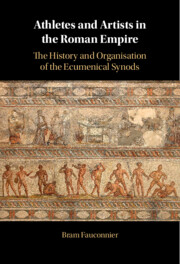Book contents
- Athletes and Artists in the Roman Empire
- Athletes and Artists in the Roman Empire
- Copyright page
- Dedication
- Contents
- Figures
- Maps
- Acknowledgements
- Note on Abbreviations
- Introduction
- Part I History
- Part II Organisation
- Chapter 7 Internal Organisation
- Chapter 8 The Members of the Ecumenical Synods
- Chapter 9 The Professional Interests of the Ecumenical Synods
- Chapter 10 The Organisation of the Festival Network
- General Conclusion
- Book part
- References
- Index Locorum
- Subject Index
Chapter 9 - The Professional Interests of the Ecumenical Synods
from Part II - Organisation
Published online by Cambridge University Press: 02 February 2023
- Athletes and Artists in the Roman Empire
- Athletes and Artists in the Roman Empire
- Copyright page
- Dedication
- Contents
- Figures
- Maps
- Acknowledgements
- Note on Abbreviations
- Introduction
- Part I History
- Part II Organisation
- Chapter 7 Internal Organisation
- Chapter 8 The Members of the Ecumenical Synods
- Chapter 9 The Professional Interests of the Ecumenical Synods
- Chapter 10 The Organisation of the Festival Network
- General Conclusion
- Book part
- References
- Index Locorum
- Subject Index
Summary
This chapter investigates why a competitor would want to become a member of one of the ecumenical synods. What could the associations do for them after they had paid the relatively high entrance fee? A major preoccupation of the synods was obtaining and safeguarding privileges for their members. There were three main types: privileges providing personal security, financial privileges and honorary privileges. A special category were the so-called opsonia, pensions granted to victors in a select category of games. Another aspect was the legal status of synod members. There are indications that synodic lobbying protected their members from the Roman infamia laws that targeted people performing in shows. The second section of this chapter focuses on the support offered by the synods during festivals. They ensured, for instance, that their members were well lodged and fed. This chapter argues that in securing privileges and offering local support, the synods relied on their extensive social networks, which reached out to local elites as well as to Roman administrators and the imperial court.
- Type
- Chapter
- Information
- Athletes and Artists in the Roman EmpireThe History and Organisation of the Ecumenical Synods, pp. 274 - 307Publisher: Cambridge University PressPrint publication year: 2023

